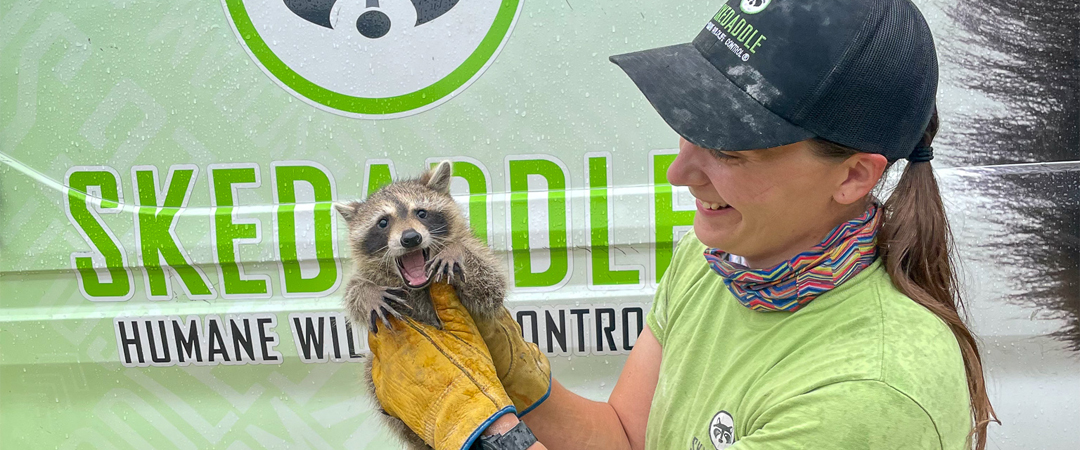Raccoons are intelligent animals with problem-solving skills similar to primates. They adapt well to urban and natural environments and play a key role in ecosystems by controlling pests and spreading seeds. Despite being labeled as a nuisance, raccoons are vital to nature’s balance.
Misunderstandings about raccoons often lead to unfair treatment. Humane approaches to coexistence allow us to protect our homes while respecting their role in the environment. At Skedaddle Humane Wildlife Control in Kitchener-Waterloo, we help homeowners address raccoon issues effectively and kindly.
In this post, we’ll share interesting facts about raccoons and explain why humane treatment benefits both people and wildlife.
Fascinating Facts About Raccoons
Raccoons are not just the mischievous animals you see sneaking around—they’re surprisingly clever and full of unique traits. From their amazing abilities to solve problems to their important role in nature, these animals have a lot to offer.
Here, we uncover what makes raccoons so fascinating!
Raccoons Are Extremely Intelligent and Resourceful
If you’ve ever seen a raccoon pop open a trash bin or unlock a latch, you’ve witnessed their amazing problem-solving skills. Studies reveal that raccoons are highly intelligent, even on the same level as some primates. They can work through puzzles to find solutions and remember how they solved problems years later!
Much of their smarts come down to their impressive paws. Raccoons’ front paws are so dexterous that they can open doors, untie ropes, and maneuver through complicated barriers. These skills allow them to find food in places that most animals can’t access.
Raccoons Have a Highly Developed Sense of Touch
Their intelligence isn’t their only superpower—raccoons rely heavily on their sense of touch, which is more developed than most animals. Their front paws are packed with nerve endings, which make them excellent at feeling and identifying objects, even in the dark.
What’s truly fascinating is how they improve this skill by wetting their paws. When their hands are damp, it enhances their sense of touch, helping them find food, like small aquatic creatures, in murky water.
They Are Social and Communicative Animals
Raccoons aren’t just lone wanderers—they are also social and expressive. They use over 200 different vocalizations to communicate. Whether it’s purring, chattering, or growling, these sounds help them share warnings, call to their young, or express emotion.
Female raccoons, in particular, create strong family bonds. Mothers are dedicated to teaching their babies survival skills like climbing, hunting for food, and staying safe from predators. Watching how they interact is a reminder of just how connected they are as a group.
Raccoons’ Role in Urban Ecosystems
It might surprise you to learn that raccoons help maintain balance in the environment. One of their biggest roles is pest control. By feeding on insects, rodents, and other small prey, they keep pest populations in check.
Raccoons’ plant-based diet, which includes fruits and nuts, also makes them seed dispersers. When they travel and eat, they help spread seeds, aiding the growth of plants and trees. Even in urban environments, their adaptability contributes to biodiversity and supports the ecosystem in ways many people overlook.
Why Raccoons Deserve Humane Treatment
Raccoons are often misunderstood creatures. While they may sometimes wander into spaces they shouldn’t, their behaviour is typically driven by survival instincts, not aggression or malice.
Let’s break down some common misconceptions and explore why raccoons deserve humane treatment—and how we can coexist with them peacefully.
- Shy by nature: Raccoons prefer to avoid conflict and only appear bold when they associate humans with easy food sources, like garbage or pet food.
- Relocation harms them: Moving raccoons to unfamiliar areas disrupts their ability to find food and shelter, exposing them to territorial threats.
- Family bonds matter: Separating mothers from their babies leaves the young vulnerable and unable to survive on their own.
- They’re part of the ecosystem: Raccoons play an important role in balancing local wildlife populations, contributing to a healthy environment.
Humane methods, like wildlife-proofing your home and sealing off entry points, offer practical, long-term solutions without harming raccoons. By taking simple preventative steps, we can protect both our spaces and these intelligent creatures, fostering a more compassionate coexistence..
Humane Approaches to Living Alongside Raccoons
At Skedaddle, we believe in humane wildlife solutions that are both effective and kind. Our approach focuses on prevention and respectful methods to help you coexist with raccoons without conflict. Here’s how we can help:
- We secure your property by ensuring garbage bins are properly protected to remove easy food sources.
- Our team seals entry points like cracks, vents, or roofing gaps to prevent raccoons from nesting in your home.
- We install one-way doors so raccoons can leave safely but won’t get back inside.
- We respect wildlife by handling every situation with care and keeping unnecessary interactions to a minimum.
- Skedaddle also spreads awareness about humane wildlife practices, creating a positive impact in your community.
By choosing Skedaddle, you’re opting for solutions that keep raccoons safe while protecting your home. Together, we can reduce conflicts and promote coexistence.
Coexisting With Raccoons Is the Right Move
Raccoons are more than their mischievous reputation—they’re highly intelligent, adaptable, and play a big role in keeping urban ecosystems healthy. Misunderstandings about these animals often lead to harm, but humane approaches to raccoon coexistence offer a kinder and more effective way to handle conflicts. By respecting their intelligence and place in the environment, we can live peacefully alongside them.
If raccoons are causing trouble on your property, Skedaddle Humane Wildlife Control in Kitchener-Waterloo can help. We specialize in professional, humane solutions to protect your home and the wildlife around it. Contact us today to request a quote or learn more!



